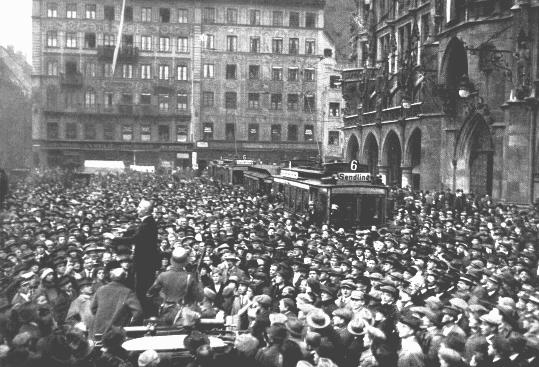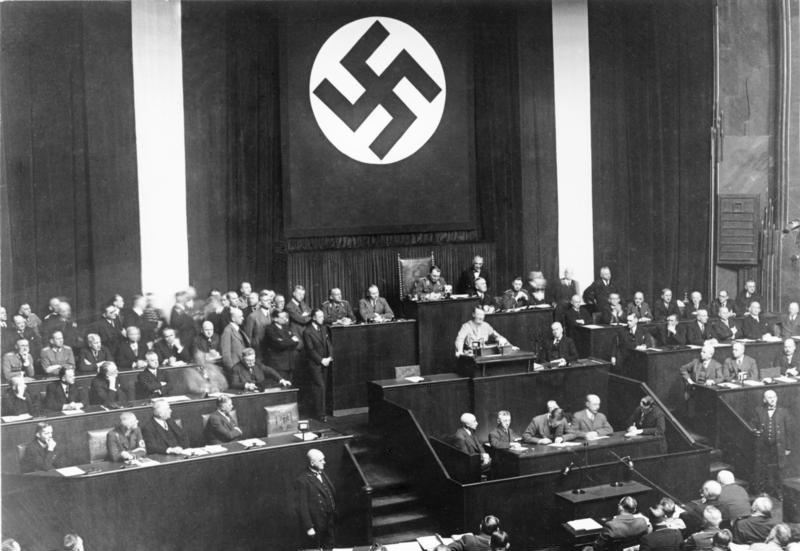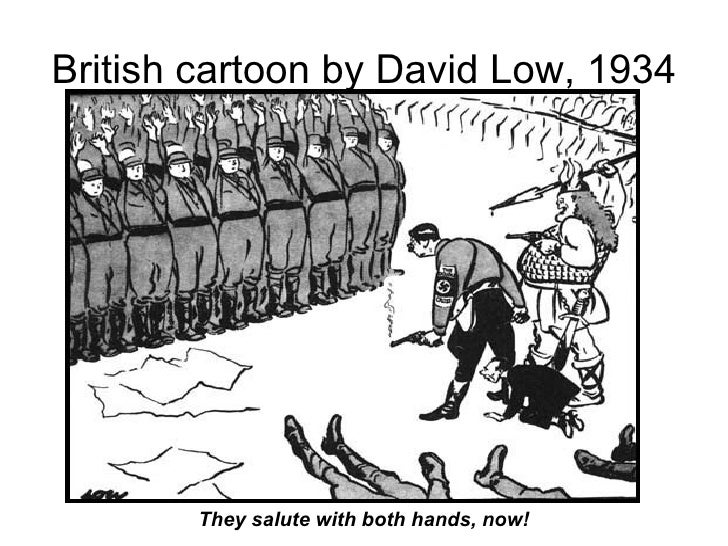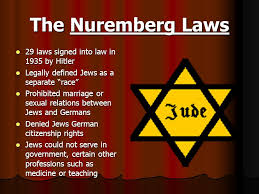Hi! I'm Manal and I'm going to summarize what we have done today in Social Sciences lesson. We've continued studying Hitler's Nazi Germany. Do you know who is Adolf Hitler? If you don't know, I'll tell you.
He was born in Austira, he participated in WW1 and was promoted to corporal. After the war the army infiltrated him as an informant to repor on the DAP, an extreme right party . As he was a skilled speaker, he soon became on of its leader.
Later, he changed the name of the party to NSDAP in 1920, and he copied Mussolini's ideas, but there were other important features:
-ANTI-SEMITISM: hate fot the Jews, considered to be the responsible of all bad things.
-SUPERIORITY OF THE ARYAN "RACE" AND NEED FOR A VITAL SPACE:space the Aryans needed to live with dignityi, which extended throughout the Great European Plain. This space included many countries which didn't agree with that, and that provoked war.
-DEMAND OF ABROGATION OF VERSAILLES TREATY: Hitler wanted to eliminate all the sanctions of the treaty of Versailles.
The NSDAP created two Nazi paramilitary groups:
SA: STURMABTEILUNG
SS: SCHUTZSTAFFEL
Security Sections were guards of Hitler, but when war started, they became guards of the concentration camps.
Beer Hall Putsch
In November 1923 the Nazis tried to seize power with a coup d' État in Munich. They tried to do something similar to Mussolini, Mussolini's March on Rome had been succesful and the Fascists had taken the government, and Hitler tried to do the same. The Nazis surrounded the Bürgerbraukeller, a beer hall where Bavarian political authorities were celebrating a meeting. The putsch failed because the army didn't join the Nazis. 14 Nazis died and their main leaders were arrrested.
Hitler was sentenced to 5 years, but he only served 8 months. During his imprisonment he wrote Mein Kampf( My Sturggle/ Battle), considered to be the bible of Nazism.
Results of the general elections.
The Nazis' results in the elections were very poor until the beginning of the 1929 crisis. The Great Depression increased their support among ruined bourgeois, middle and samll farmers, industrialists and bankers.
In july 1932 the NSDAP reached its peak: they were the most woted party with more than 13 million votes, but they didn't have majority and the president of the republic, Marshall Hindenburg, refused to appoint Hitler prime minister. They didn't win the elections but they started increasing the number of seats in the Reichstag when the economic crisis started, but later their number of votes decreased.
In the following elections in November 1932 the NSDAP lost 2 million wotes. But in January 1933 the conservative forces convinced Hindenburg to appoint Hitler prime minister.
In Jamuary 1933, Hitler was appointed prime minister. Hitler's first government included 3 Nazis out of 11 ministers. Hitler convinced Hindenburg to call new elections for the 5th March.

Reichstage fire ( 27th february)
The Nazis committed arson against the Reichstag and accused the communists. The government issued an emergency decree restricting liberties. Many oppositin leaders were arrested and sent to detention camps.
And in this situation, using intimidation and violence against the opposition, the Nazis won elections. Hitler demanded full powers in the Reichstag.
The secret police (Gestapo) was created and in July the NSDAP became the only legal party.
Nazi boycott against the Jews (april 1933)
Persecution against the Jews started immediately. The Nazis did a lot of things against the Jews. German Jews who had money started emigrating to other places because they suffered a lot living in that way.

Burning of books
The Nazis burnt books of aurthors considered to be against Germany: books by Einstein, Marx, Hemingway, Proust; Heinrich and Thomas Mann and other authors were burnt.

Forced labour camps
Members of opposition parties were the first imprisoned in concentration camps, ruled by the SS.
Night of the Long Knives
Hitler ordered to kill those who opposed him in his party. especially those in the SA.
When HItler had almost everything controlled, the president Hidenburg died in August 1934. Then Hitler concentrated the post of chancellor and president and the Army swore fielty to him. He was called "Führer" of the Germans and proclaimed the 3rd Reich.

Nuremberg Laws
They excluded the Jews from German nationality and forbade them to work in contact with Germans or to marry them. If one of your ancestor was Jewish, you were also a Jewish. The Jewish couldn't go to the cinema, or the swimming pool with the Aryans, so everyone who could leave, left Germany.
Night of Broken Glass
On the 9th November 1938 there were attacks to synagogues and Jewish shops all around Germany:
-90 Jews killed.
-more than 30,000 Jews were arrested and sent to camps.
-massive emigration of Jews to other countries.
After all this destruction, the Jewshad to pay for all thatt happened. The government said that it was their responsibility.

Correction of the Versailles Treaty
In March 1936, they remilitarized the West Bank of Rhineland.
In March 1936, the Nazis occupied Austrian and annexed it to Germany (Anschluss)
Munich Agreement
Hitler claimed Sudentenland, a Czechoslvakian territory inhabited by 3 million German speakers. The main European powers met at Munich and signed an agreement to cede Sudentenland to Germany, They didn't want to provoke a war and saw Hitler as an important ally to stop Stalin.
Hitler promised to stop his territorial demands, but he didn`t keep his promise.

In March 1939 the Nazis occupied Bohemia and Moravia and established a protectorate in Slovakia.
Hitler demanded the Danzig Corridor to Poland. Poland asked the UK and France for help.
NAZI-SOVIET PACT:
Secret agreement signed between Germany and the USSR. Hitler wanted to be sure of the USSR neutrality in the invasion of Poland and Stalin wanted to gain time in order to be ready for a future war against the Nazis.
Outbreak of World War 2
1st September: invasion of Poland using Thunder War: combined attack of artillery and aircraft.
3rd September: France and the United Kingdom declared war on Germany.
17th September: the Soviet Union occupied the Eastern part of Poland, Finland , Estonia, Latvia and Lithuania.
Poland was occupied in four weeks.
VOCABULARY:
Vital space: espacio vital
abrogation: supresión de una ley
SA: Secciones de asalto (camisas pardas)
SS: secciones de seguridad (camisas negras)
Beer Hall Putsch: Putsch de la Cervecería
My struggle: mi lucha
Reichstag: parlamento en Alemania
Arson: incendio provocado
boycott: boicotear
Triumph of the Will: El triunfo de la voluntad
Night of Broken glass: noche de cristales rotos
roundup: redada
enabling aact: ley habilitante
appeasement policy: política de apaciguamiento
Puppet state : Estado títere.













3 comments:
Hello Manal,
You've done such a great work! I love the carttons you've included. I didn't know these ones. I'll save them for my collection ;)
I'll be back later for the corrections. Congratulations for your work!
Thanks Paqui, yes! The carttons are very interesting and mean!
It took me a lot of time to do this journal. I think it has been the best journal I have done.
I'll wait your corrections.
Hello again.
I've just corrected the spelling mistakes directly. I've made you work too much this week, so eveything is corrected right now. Have a nice summer. Bye!
Post a Comment